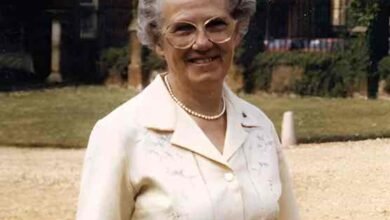Elspeth Turner: The Historian, Educator, and Storyteller Who Preserved the Spirit of the Scottish Borders

Elspeth Turner is a name that resonates deeply within the fields of Scottish history, education, and cultural storytelling. Known for her extensive contribution to understanding the social and economic evolution of Scotland, Turner has spent her life intertwining academic research, public education, and the living traditions of storytelling. A historian by training and a storyteller by heart, her career reflects a rare fusion of intellect and imagination.
Over the years, she has become an admired figure for her ability to transform local history into living memory, bringing to life the tales, traditions, and landscapes of the Scottish Borders. From her days as a Senior Lecturer at the University of Edinburgh to her influential role in the Lothians Equal Access Programme for Schools (LEAPS), Elspeth Turner’s career is marked by dedication to accessibility, equality, and cultural preservation. Through her co-authored works, particularly Tweed Dales: Journeys and Evocations, Turner has left an enduring legacy that bridges the gap between scholarship and story.
Early Life and Background
Elspeth Turner was born and raised in the Scottish Borders, a region steeped in folklore, poetry, and pastoral beauty. Her early environment profoundly influenced her lifelong fascination with landscape, memory, and storytelling. Growing up amidst rolling hills, ancient rivers, and ruins whispering the past, Turner developed a sensitivity to how history lives in the land itself. This connection later became a central theme in her writing and teaching.
Scotland’s Borders have always been a place of transition — between highland and lowland, English and Scottish influences, modernity and myth. Turner grew up immersed in these contrasts, which shaped her curiosity about social change, human struggle, and the stories that bind communities together. These early impressions nurtured her love for research and eventually guided her towards academia.
Academic Journey and Professional Growth
Elspeth Turner’s formal academic journey led her to the University of Edinburgh, where she established herself as a respected historian. As a Senior Lecturer in Economic and Social History, she taught generations of students to appreciate the interplay between economic systems and everyday lives. Her research often focused on how ordinary people experienced historical transformations — from industrial development to social policy shifts — reflecting her enduring interest in the human dimension of history.
Her lectures were known for their clarity, empathy, and connection to real-world contexts. Students and colleagues alike admired her ability to draw on Scottish examples to illuminate universal historical patterns. Turner’s teaching style was not confined to the classroom; she saw education as a public good, something to be shared widely and equitably.
Leadership in Equal Access and Educational Reform
After years in academia, Turner’s commitment to widening participation in education took a practical form through her leadership of the Lothians Equal Access Programme for Schools (LEAPS). As the programme’s first director, she worked to bridge the gap between higher education and underrepresented school communities. Her leadership was guided by the belief that education should be inclusive and empowering, not restricted by background or circumstance.
Under her direction, LEAPS became a pioneering model in Scotland for creating pathways to university for young people from diverse social and economic contexts. Turner’s work here was both visionary and deeply personal. She understood the transformative potential of education because she had witnessed it herself. Her initiative not only expanded access but also inspired a generation of educators to see outreach as an integral part of academic responsibility.
Research on Children’s Rights and Social Justice
Elspeth Turner’s passion for equality and social welfare also extended into research. Collaborating with her late husband, Professor Stewart Asquith — a renowned scholar of social policy and children’s rights — she contributed to works that explored the ethical and structural dimensions of childhood, welfare, and protection. Together, their research advanced the understanding of how societies can better safeguard the well-being and dignity of young people.
This partnership reflected Turner’s ability to merge academic rigour with moral insight. Her perspective on history was never abstract; it was grounded in empathy, justice, and a commitment to improving the human condition. The same empathy that coloured her storytelling also guided her scholarship — both were ways of giving voice to the unheard.
Return to Cultural Roots and Storytelling
In the later stages of her career, Elspeth Turner turned increasingly towards cultural history and storytelling. Her work became more reflective, blending academic precision with the lyrical beauty of narrative. She recognised that history was not only written in books but also carried in songs, myths, and memories passed down through generations.
This transition culminated in her collaboration with Scottish author and folklorist Donald Smith on Tweed Dales: Journeys and Evocations. The book captures six journeys across the Borders region, exploring how geography, culture, and human experience intertwine. It invites readers to travel through valleys and hills not just as landscapes but as living archives of Scotland’s identity.
Tweed Dales: Journeys and Evocations
Tweed Dales: Journeys and Evocations stands as a defining testament to Turner’s belief in storytelling as a form of history. The book is both a travelogue and a meditation — a literary journey through places where past and present coexist. Each journey reveals a different facet of the Borders: its folklore, its people, its ancient paths, and its quiet endurance.
In this work, Turner and Smith guide readers through Ettrick, Teviotdale, Gala Water, and other iconic sites along the River Tweed. But the journeys are not merely geographical; they are emotional and intellectual explorations of belonging, memory, and identity. Turner’s voice brings an academic depth to Smith’s poetic style, together creating a narrative that is at once scholarly and evocative.
The book has been praised for capturing the essence of the Borders — its layered histories, its timeless myths, and its sense of place. Critics noted that Tweed Dales invites readers to experience history not as distant fact but as something felt beneath the feet, carried by the wind, and alive in the stories of the land.
Storytelling and Heritage Preservation
Elspeth Turner’s storytelling extends beyond the written page. Through public talks, such as her 2022 presentation for the Saltire Society in Edinburgh, she has continued to engage audiences with the living culture of the Borders. Her talks combine historical insight with vivid narrative, making the past accessible and inspiring.
For Turner, storytelling is not entertainment alone; it is a form of preservation. It keeps traditions alive, sustains local identities, and helps communities reconnect with their roots. In an era of rapid change, her work serves as a reminder that cultural continuity depends on the stories we choose to remember and retell.
Thematic Core of Her Work
Across all of Elspeth Turner’s endeavours, certain themes consistently emerge:
1. Landscape and Identity
She portrays the Scottish landscape as an active participant in history — shaping lives, values, and collective memory.
2. Social Justice and Education
Her career embodies the conviction that access to learning and opportunity should be a right, not a privilege.
3. Cultural Continuity
Through her storytelling, she bridges the past and present, ensuring that Scotland’s intangible heritage endures for future generations.
4. Human Connection
Whether writing about economics, folklore, or education, Turner emphasises empathy, understanding, and shared humanity.
Influence and Legacy
Elspeth Turner’s influence can be felt across multiple fields. In academia, she helped redefine the social history curriculum by centring the experiences of ordinary people. In education policy, her leadership in equal access programmes continues to inspire similar initiatives across the UK. In literature and culture, she has revitalised interest in the Borders as a site of rich narrative heritage.
Her interdisciplinary approach — moving seamlessly between scholarship, activism, and art — sets her apart. She reminds us that the divisions between disciplines are artificial when the goal is to understand people and their stories. Her career demonstrates how intellectual curiosity and moral conviction can coexist harmoniously.
A Life Dedicated to Learning and Story
Elspeth Turner’s life is, in essence, a story about stories — about how they educate, connect, and sustain. From university lecture halls to quiet Borders valleys, her journey has been guided by a belief that knowledge and imagination are not opposites but companions. She has shown that history, when told with compassion, can be a form of healing — a way to give meaning to the present by listening to the echoes of the past.
Her career invites us all to look around our own landscapes — physical or emotional — and ask what stories they hold. Like the River Tweed, her work flows through multiple terrains, carrying with it memory, learning, and the unbreakable link between people and place.
Conclusion
Elspeth Turner’s contribution to Scottish life is profound and multifaceted. As a historian, she documented the forces that shaped society. As an educator, she fought for inclusivity and fairness. And as a storyteller, she gave voice to the landscape itself, reminding us that every hill and river has a tale worth telling.
Her life’s work teaches that history is not confined to archives — it lives in communities, in stories, and in the language of the land. In celebrating Elspeth Turner, we celebrate the idea that knowledge is both an academic pursuit and a shared inheritance. Her legacy endures in classrooms, in books, and along the winding paths of the Borders she so loved.



